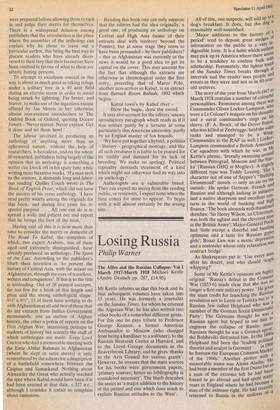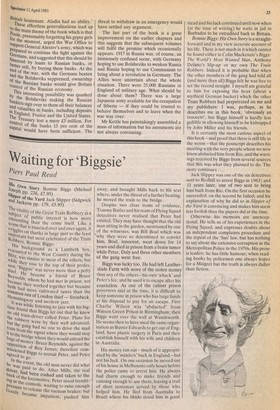Losing Russia
Philip Warner
The Allies and the Russian Collapse: Vol I March 1917-March 1918 Michael Kettle (Andre Deutsch pp. 287, £14.95) Mr Kettle informs us that this book and its four subsequent volumes have taken him 15 years. He was formerly a journalist on the Sunday Times, for whom he covered the Algerian War; he has Also written two other books of a somewhat different genre. For this one he pays tribute to Professor George Kennan, a former American Ambassador to Moscow (who changed from being a hardliner to a softliner), to the Russian Research Centre at Harvard, and to the Lloyd George documents in the Beaverbrook Library; and he gives `thanks to the Arts Council for various grants'. However, he stresses that the main sources for his books were government papers, `primary sources; hence no bibliography is considered necessary'. The blurb describes the series as `a major addition to the history of the period and one which does much to explain Russian attitudes to the West'. All of this, one suspectswilIaddupt0,a dog's breakfast. It does, but the dog 15 reasonably well-nourished. `Major additions to the history of al period' tend to deposit great wedges information on the public in a very digestible form. It is a habit which authors may pick up in America where there seals to be a tendency to confuse bulk wit,l1 scholarship. Fortunately, the lighter toucti of the Sunday Times breaks through at intervals and the reader sees people arw events as they were and not as in 60-Yeat' old archives. The story of the year from March 1917 to March 1918 contains a number of colourful personalities. Prominent among them was Commander Oliver Locker-Lampson, wore a Lt Colonel's insignia on his shoulder and a naval commander's rings on his sleeve. (F. A. Brock, of the Dover Patrol' who Was killed at Zeebrugge, held the same ranks and managed to be a Wi°g. Commander in the RAF as well.) Locker; Lampson commanded a British Armoire° Car squadron with which he was, inMr Kettle's phrase, `literally swanning arounu between Petrograd, Moscow and the Stav. ka' (Russian GHQ at Mogilev). A different type was Teddy Lessing, 'like a character out of one of Sapper's "Bulldog Drummond" novels — only an ass on the outside. He spoke German, French ati Russian and although lacking in initiative had a native sharpness and excellent contacts in the world of banking and hie, finance.' The book abounds with thumbnail sketches: `Sir Henry Wilson, an Ulsterrnan, was both the ugliest and the cleverest man in the British Army'; Major-General Poole had `little except a cheerful and bustling,/ optimism and a taste for Russian gYP,s.' girls'; Bonar Law was a manic depressive slightly and a teetotaler whose only relaxation was contract bridge'. As Shakespeare put it: `Use every Ma° afterwhipping?', is desert, and who should ,scape whipping?' Some of Mr Kettle's opinions are highlY original. `Russia's defeat in the Crimean War (1853-6) made clear that she was 00 longer a first-rate military power.' He gives themaincnreodtitto in o for Trotsky Russian revolution Ina to 'a Russian Jew called Helphand who was a member of the German Social Democratic Party'. The Germans thought he was a Russian agent but hoped to use him t° engineer the collapse of Russia; Mani, Russians thought he was a German the Bolsheviks distrusted him. In the Helphand had been the `leading politica' theorist and analyst in Germany he foresaw the European Common Marketg of the 1960s.' Another plotter with memorable name was Alexis Aladin. '11,e_ had been a member of the first Durna but as a man of the extreme left he had been forced to go abroad and had spent mall years in England where he had become a man of the extreme right. He had recently returned to Russia in the uniform of a British lieutenant. Aladin had no ability.' These effortless generalisations lead up to the main theme of the book which is that ePoole, presumably forgetting his gypsy girls i°r the moment, urged the War Office to suPport General Alexiev's army, which was Prepared to continue the fight against the Germans, and suggested that this should be financed by loans to Russian banks, or better still, by buying these banks. At the end of the war, with the Germans-beaten and the Bolsheviks suppressed, ownership °f the Russian banks would give Britain Control of the Russian economy. This interesting possibility was quashed by the Bolsheviks making the Russian bankers sign over to them all their balances .riczl valuables in banks, including deposits !;,1 England, France and the United States. The Treasury lost a mere £3 million. For Control of the banks 15 per cent of the capital would have been sufficient. The threat to withdraw in an emergency would have settled any argument.
The last part of the book is a great improvement on the earlier, chapters and this suggests that the subsequent volumes will fulfil the promise which occasionally appears. 1917 in Russia was, of course, an immensely confused scene, with Germany hoping to use Bolsheviks to weaken Russia and Russia hoping to use Communism to bring about a revolution in Germany. The Allies were uncertain about the whole situation. There were 25,000 Russians in England of military age. What should be done about them? There was a large Japanese army available for the occupation of Siberia — if they could be trusted to behave themselves and to leave when the war was over.
Mr Kettle has painstakingly assembled a mass of information but his asessments are not always convincing.











































 Previous page
Previous page